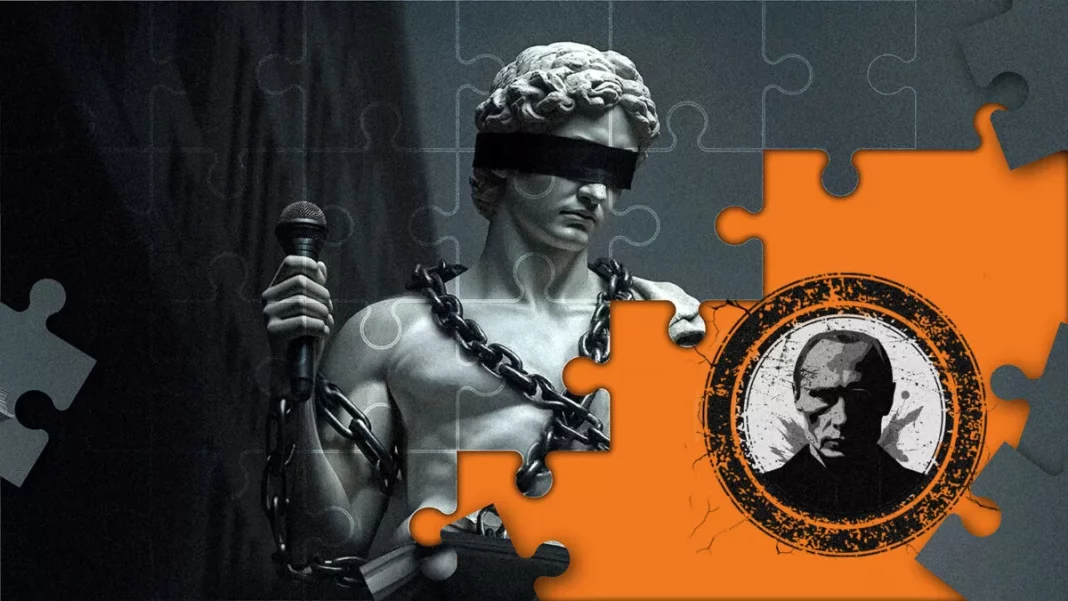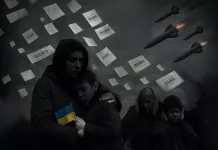By EUvsDisinfo
The war against Ukraine has driven the Russian regime to new extremes, creating a cult of personality around Vladimir Putin which is reaching new levels. This weaponisation of Putin’s image has become a crucial element in sustaining domestic support for the invasion, while attempting to project strength internationally.
“No Putin, No Russia”
The foundation for today’s personality cult were laid years ago. As Russia illegally seized Crimea in 2014, Vyacheslav Volodin, then Kremlin Deputy Chief of Staff, declared “there is no Russia today if there is no Putin.” This sentiment has evolved into almost an official doctrine, positioning Putin as indispensable to Russia’s existence, and equating any criticism of him with an attack on Russia itself.
From leader to war-time czar
Putin’s carefully crafted image has undergone significant transformation since the full-scale invasion of Ukraine. State ceremonies, such as his inauguration in May 2024 for yet another term as president, have taken on increasingly monarchical overtones. Putin has been the centre of political power in Russia since January 2000. An entire new generation of Russians has only experienced life under Putin. Victory Day parades on 9th of May have become platforms for displaying not just military might, but also Putin’s personal authority as a wartime leader.
Manufacturing popularity
Russian state TV and other electronic outlets help craft the image, and feature Putin in wall-to-wall coverage every single day. The Kremlin’s disinformation machine has worked tirelessly for years to portray Putin as universally admired. State media outlets like RIA exhaustively report on every congratulatory message he receives from fellow autocrats. Carefully orchestrated displays of public adoration are organised for his birthday, as if it were a state occasion.
There is a special focus on portraying Putin as internationally respected and admired, and his person and birthday play a role in Russian influence campaigns abroad. This year, the Russia House in Niamey, the capital of Niger, released and seemingly produced a music video with local rappers on the occasion of his birthday.
Silencing dissent through devotion
The personality cult serves a dual purpose: while elevating Putin, it simultaneously justifies the suppression of any opposition, as this is not a matter of politics but is transformed into unpatriotic treason. The fate of regime critics like Navanly and Nemtsov, or even those of one-time allies fallen out Kremlin’s favour like Prigozhin and Girkin, demonstrates the dangers of challenging the established order. The message is clear – questioning Putin means questioning Russia itself, an act now punishable under increasingly draconian laws.
Fuelling the war machine
This extreme personalisation of power has become instrumental in sustaining Russia’s war effort. By positioning Putin as the embodiment of Russian statehood and military might, the regime can present the invasion of Ukraine, not as a political choice, but as an historical necessity. State media portrays Putin as the main defender of Russian interests against alleged Western aggression, using this narrative to justify both the war abroad and repression at home.
State ceremonies reinforce this message. At the Moscow’s Luzhniki stadium event in March 2024 marking 10 years since the annexation of Crimea, Putin spoke before crowds holding “For the President” banners, with the now-infamous “Z” symbol prominently on display. The message was clear: support for Putin and support for the war are inseparable.
The cost of unaccountability
The ultimate danger of this personality cult lies in its elimination of institutional checks and balances. By elevating Putin above all scrutiny, it has created a system where major decisions – including the invasion of Ukraine – can be made without meaningful accountability. The result is a self-reinforcing cycle, where military aggression feeds the cult of personality, which in turn enables further aggression.
The weaponisation of Putin’s image represents more than mere propaganda – it has become a central pillar in Russia’s war machinery, providing the ideological framework for both external aggression and internal repression. As Russia continues its assault on Ukraine, understanding this dynamic is crucial for comprehending the regime’s actions and anticipating its future moves.
Don’t be deceived!
By EUvsDisinfo





